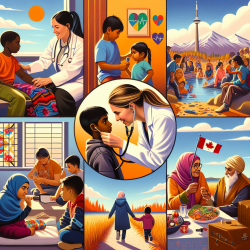Introduction
The intersection of migration and access to health care is a critical area of study, particularly for female economic migrants. As practitioners in speech-language pathology, understanding the unique challenges faced by this demographic can enhance our ability to provide effective support and interventions. The recent study, "Intersection of Migration and Access to Health Care: Experiences and Perceptions of Female Economic Migrants in Canada," offers valuable insights into these challenges and provides a foundation for improving outcomes for migrant children.
Key Findings from the Study
The study utilized a focused ethnography design to explore the experiences of 29 female economic migrants from Ghana, Nigeria, and South Africa. Four major themes emerged:
- Social Connectedness: The importance of social networks in navigating access to care was highlighted. Migrants with strong social connections found it easier to access health services.
- Place of Origin: The healthcare systems in migrants' countries of origin influenced their experiences in Canada, affecting their access to care.
- Financial Accessibility: While Canada offers universal healthcare, the study participants noted challenges related to out-of-pocket expenses for services like dental and eye care.
- Historical and Cultural Orientation: Cultural beliefs and practices from migrants' home countries influenced their interactions with the Canadian healthcare system.
Implications for Practitioners
For speech-language pathologists working with migrant children, these findings underscore the importance of considering the broader social and cultural contexts in which these children live. Here are some practical strategies to enhance your practice:
- Build Social Connections: Encourage families to engage with community resources and support networks. This can improve access to healthcare and other services.
- Cultural Competence: Develop an understanding of the cultural backgrounds of the families you work with. This can improve communication and trust, leading to better therapeutic outcomes.
- Advocate for Holistic Care: Work with other healthcare providers to ensure that migrant families receive comprehensive care that addresses both their medical and social needs.
- Financial Guidance: Provide information about financial assistance programs that can help families manage healthcare costs.
Encouraging Further Research
The study highlights the need for further research into the specific needs of migrant populations, particularly children. Practitioners are encouraged to engage in research activities or collaborate with researchers to explore these areas further. This can lead to the development of targeted interventions that address the unique challenges faced by migrant children.
Conclusion
Understanding the intersection of migration and healthcare access is crucial for practitioners aiming to improve outcomes for migrant children. By integrating the findings of this study into practice, speech-language pathologists can play a pivotal role in supporting the health and well-being of this vulnerable population.
To read the original research paper, please follow this link: Intersection of Migration and Access to Health Care: Experiences and Perceptions of Female Economic Migrants in Canada.










